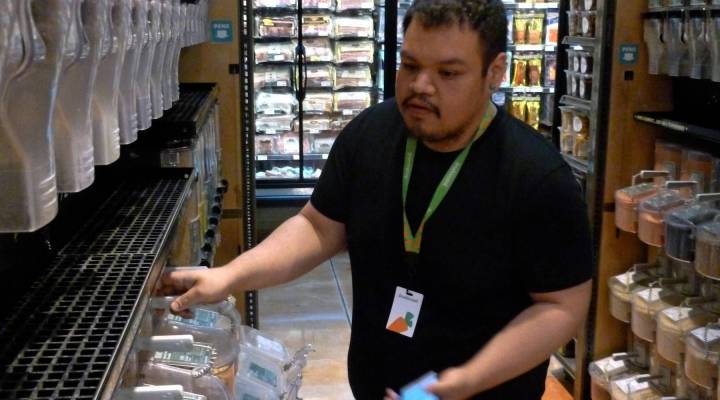
Instacart workers feel sting of pay restructure

It has been about two months since the grocery delivery app, Instacart, restructured worker pay. At the time the company said it was making adjustments so “the Instacart community would be better positioned to grow together.” Workers across the country are saying the upshot is that they are now making less.
The exact details are hard to parse out. Workers get paid different amounts in different states, and tips and delivery charges vary. The company has not released comprehensive details on the pay restructure.
This has not been the first pay adjustment at Instacart, and it probably won’t be the last. Gig companies like Instacart, Uber, and TaskRabbit are known for changing their compensation models often and without much notice.
To give me an inside peek at what life is like for one of its workers, Instacart set me up with Fernando Elvira. I met him at a Whole Foods in San Francisco.
At noon the store is abuzz. Instacart shoppers are scurrying around to fulfill the orders popping in on their phones. It seems like there are more people here shopping for someone else than for themselves.
Elvira is an expert shopper. He knows the store inside and out. In the produce aisle, he teaches me the secret to finding the perfect avocado. First, you remove that little nub at the end and look at the color. Green means it’s not ready. Brown means it’s overripe. Yellow is just right.
Elvira loves this job. He started two years ago after dropping out of UC Davis, a nearby state school. He says he could no longer afford tuition. Now he is living with his parents and attending a local college.
Working for Instacart, Elvira says he makes five hundred to a thousand dollars a week, adding that the pay changes have not made a big impact on his take-home amount. Even though he likes the delivery gig, Elvira hopes someday to actually get employed at Instacart and have a real steady job.
“Hopefully I get another opportunity when I can grow with the company and maybe get a hired position,” he said.
It’s tricky to find Instacart workers who will talk to the media if you do not go through Instacart. Like other gig companies, there is no big union, and nothing to protect workers from getting kicked off the app.
Instacart worker Isaac DeSanto said he talked to me because he is frustrated and plans to move on anyway. He’s a graduating college senior at UC Berkeley. I contacted him through a Facebook group that Instacart workers made so they could communicate about the company.
Through the Facebook group, I got in touch with several others workers who were upset about the pay change, but no one wanted to go on the record. They were worried about doing anything that might jeopardize the gig.
As a college kid, however, DeSanto says he’s not in that position. “I’m fortunate enough not to be as reliant on it as others would be,” he said.
DeSanto works in the Bay Area, where Instacart slashed delivery rates during the pay restructure. He says drivers get to keep more tips, but that doesn’t make up for the cuts.
Under the old system, he made twenty-five dollars an hour. Now, he said he is earning five dollars less per hour. For him, this abrupt change was a wake up call about the weak position of the modern worker.
“The pay cut was just another step in feeling replaceable,” he said.
Instacart said it will not and does not retaliate against workers for talking to the media. In a statement, it said workers will earn between 15 and 20 dollars on average, although it is not releasing data to back that up or other details on the cuts.
About a week after I reached out to the Instacart group on Facebook, another worker got back in touch with me. He wanted to talk.
KD Davis is a full-services shopper for Instacart in Houston, Texas. He said the pay cut reduced his take-home by thirty percent. And with two kids, one a newborn, that’s a big loss. Even so, Davis was reluctant to do an interview. He did not want to risk losing the gig. But his wife, who works full-time elsewhere, said he should speak his mind.
“Everybody needs a voice, everybody needs to get out there,” Davis said. “You need someone standing up and hopefully someone else will hear what I am saying and they will move forward if they feel they’re being treated unfairly as well.”
Davis wants consumers to know what it is like for workers at gig companies like Instacart.
“Things can change on a whim, no notice, whether it’s the good or the bad,” Davis said. “So, just think again about the kind of company you want to give your business to and think about the employees that are bringing you these services.”
Davis does not blame customers for ordering groceries through Instacart. It is convenient, he said, adding that he would use it too if he had the money. Davis just wants to remind people that behind these on-demand services are workers like him who you don’t often hear from.
There’s a lot happening in the world. Through it all, Marketplace is here for you.
You rely on Marketplace to break down the world’s events and tell you how it affects you in a fact-based, approachable way. We rely on your financial support to keep making that possible.
Your donation today powers the independent journalism that you rely on. For just $5/month, you can help sustain Marketplace so we can keep reporting on the things that matter to you.












